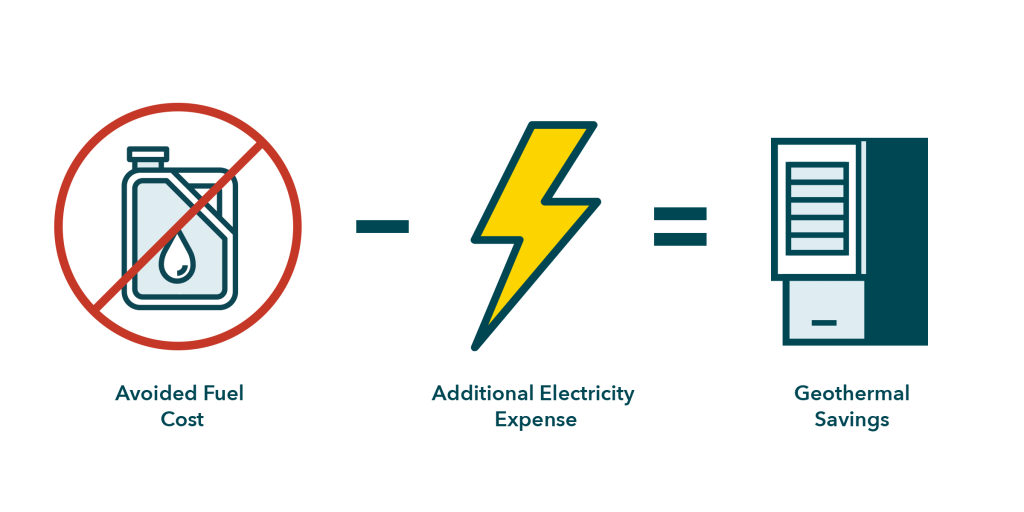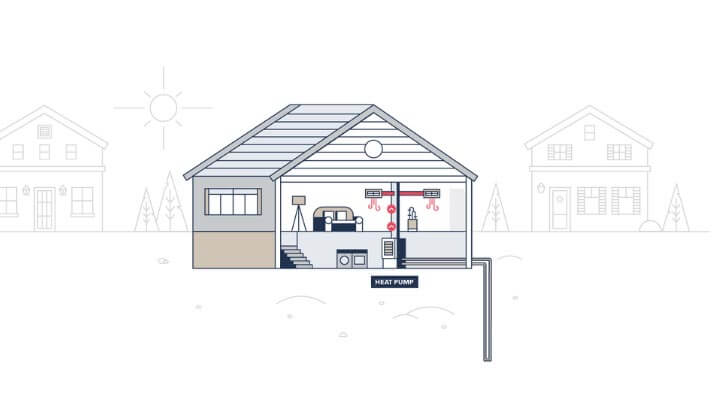What is a geothermal heat pump?
A geothermal heat pump (also called a ground source heat pump) is a renewable alternative to a furnace or boiler. It’s a critical component of a geothermal system.
A geothermal system is made of 2 major parts:
- A geothermal heat pump that sits inside your home (typically where the furnace used to sit)
- Underground pipes, called ground loops, installed in your yard below the frost line
The key difference between furnaces and geothermal heat pumps is the heat source being used to warm the home. A typical furnace creates heat by burning oil or gas in its combustion chamber, whereas a geothermal heat pump simply moves heat from the ground that already exists.
Additionally, while furnaces and boilers can only heat, many geothermal heat pumps (like Dandelion Geothermal) can heat and cool.
How do geothermal systems work?
Simply put, a geothermal system pulls heat from the ground to heat your home in the winter, and it dumps heat from your home into the ground to cool it in the summer. That explanation might sound a little science fiction, but geothermal systems operate quite similarly to the refrigerator in your kitchen.
Just a few feet below the frost line, the ground is a constant ~50 degrees Fahrenheit year round. A water-based solution circulates through underground pipes where it absorbs the ground’s heat and is carried into the geothermal heat pump.
The solution exchanges its heat with the liquid refrigerant inside the heat pump. The refrigerant is then vaporized and passed through a compressor where its temperature and pressure are increased. Finally, the hot vapor enters a heat exchanger where it transfers its heat to the air. This hot air is distributed through the home’s ductwork and warmed to whatever temperature set on the thermostat.

Are geothermal heat pumps effective in cold climates?
Yes, geothermal heat pumps can and do work just fine in cold winter climates. While people might experience seasonal changes above ground, the earth below the frostline is unaffected at 50 degrees.
How efficient are geothermal heat pumps?
For every 1 unit of energy used to power your geothermal system, 4 units of heat energy are supplied. That’s about 400% efficient! Geothermal heat pumps can achieve this efficiency because they don’t create heat – they just transfer it. Only about one-third to one-fourth of the energy delivered in heating with a geothermal systems comes from electricity consumption. The rest is extracted from the ground.

In contrast, a brand new high-efficiency furnace might be rated 96% or even 98% efficient. For every 100 units of energy used to power your furnace, 96 units of heat energy are supplied and 4 units are lost as waste.
Some energy is always lost in the process of creating heat. ALL of the energy delivered with a combustion-based furnace is created by burning a fuel source.
Do geothermal heat pumps use electricity?
Yes, they do (as do furnaces, boilers, and air conditioners). They will not work in a power outage without a backup generator or battery storage system.
How long do geothermal heat pumps last?
Geothermal heat pumps last significantly longer than conventional equipment. They typically last 20-25 years.
In contrast, conventional furnaces generally last anywhere between 15 and 20 years, and central air conditioners last 10 to 15 years.

Geothermal heat pumps last a long time for two big reasons:
- The equipment is protected indoors from weather and vandalism.
- No combustion (fire!) within the geothermal heat pump means no flame related wear-and-tear and more moderate temperatures within the equipment, protecting from internal extremes.
Geothermal ground loops last even longer, typically more than 50 years and even up to 100!
What kind of maintenance do geothermal heat pumps require?
The Dandelion Geothermal systems are inherently low maintenance. However, there are some key best practices we recommend to ensure the system runs well:
- Every three months, change the air filters. If you run the fan continuously, have pets, or live in a dust-prone environment, filters should be changed more frequently. A good rule of thumb is, if the filters look visually dirty, they should be changed.
- Each year, we recommend having a qualified service technician perform a basic inspection and maintenance of the system. Dandelion offers this service for customers. During a maintenance visit, the technician will provide the following services:
- Deep coil cleaning, as needed. This keeps your system running at peak efficiency by removing debris and dust from your coils.
- Filter change (filter cost not included).
- Verify the condensate drain line is operational.
- Install 2 pan tablets.
- Re-torque all electrical connections.
- Verify thermostat settings.
- Verify stage 1 and 2 operation in heating, cooling and auxiliary mode (if applicable).
- Check ground loop pressure, temperatures and flow rates.
- Verify glycol concentration is within specification.
- Verify capacitor readings are within specification.
Dandelion offers Service Plans that include discounted service and maintenance visits for customers who value total peace of mind when it comes to service and maintenance.
What’s the difference between a geothermal heat pump and an air-source heat pump?
A geothermal heat pump extracts heat from the ground where it’s a stable ~50-55 degrees just a few feet below the frost line. An air-source heat pump extracts heat from the outside air.
A ground-source heat pump is typically more efficient than an air-source heat pump because there’s less fluctuation in the temperature underground than the air outside. That means geothermal heat pumps use less energy to heat and cool.
Think of it this way – you want the inside of your home to be about 70 degrees. The ground temperature is about 50 degrees. A geothermal heat pump only needs to boost the starting temperature 20 degrees to keep your home comfortable year-round.
The temperature outside, though, might be 10 degrees or 90 degrees! It’s a lot harder for an air source heat pump to bring the temperature in your home up or down to 70 degrees when it’s starting from an extreme place.
Can I get any tax credits or other incentives for installing a geothermal heat pump?
Yes! Check out our comprehensive guide to the Federal Geothermal Tax Credit and learn what other state and utility incentives are available.
How much does it cost to install a geothermal heating and cooling system?
Dandelion Geothermal starts at about $18,000 – $25,000 for a 3 – 5 ton heat pump system which includes all installation costs after state and federal incentives are applied.
Zero down financing options are also available. About half of our customers opt to finance the system and start saving right away.
The price can increase based on additional complexity like zoning and electrical upgrades. Curious what other factors can impact the final cost? We put together the most comprehensive geothermal pricing guide on the internet.
How much does it cost to replace a geothermal heat pump?
An average geothermal heat pump costs between $1,500 to $2,500 per ton. While the precise heat pump size is dictated by the home’s heating and cooling needs, a standard single-family 2,000 square foot home usually requires a 5 ton heat pump ($7,500 to $12,500).
A geothermal heat pump typically lasts between 20-25 years.
How much money can I save with a geothermal heat pump?
Most homeowners see a substantial drop in heating fuel bills and a moderate increase in their electrical bills, leading to an overall reduction in monthly energy bills. Depending on the type of fuel your old furnace used and your heating needs, the overall savings could total into thousands of dollars over the life of your Dandelion Geothermal system.
These cost savings can be understood through a simple equation:

Heating costs and the savings associated with a geothermal system are relative to energy prices. As the prices of natural gas, propane, and heating oil increase with respect to the price of electricity, the savings associated with getting geothermal increase.
Curious to see if geothermal is a good option for you? Click the link to take our short qualification quiz!


